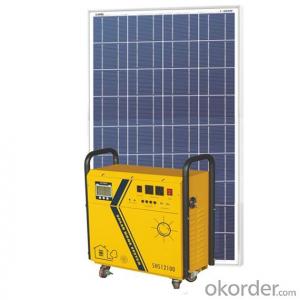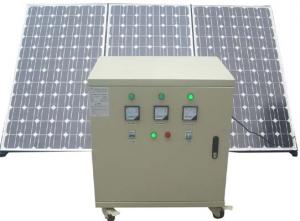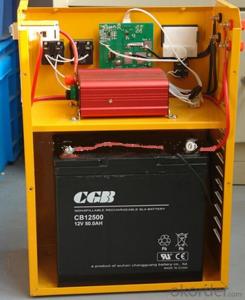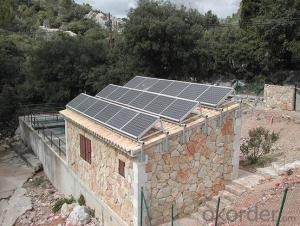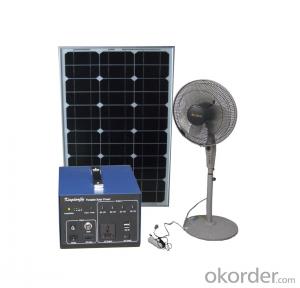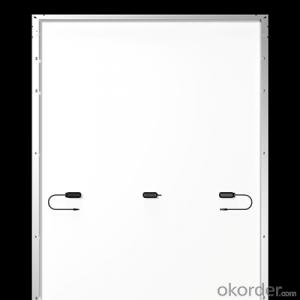Portable Solar Power Systerm Kits/Camping Kits Home Use 2000W Solar System
- Loading Port:
- Shanghai
- Payment Terms:
- TT or LC
- Min Order Qty:
- 2000 watt
- Supply Capability:
- 200000 watt/month
OKorder Service Pledge
OKorder Financial Service
You Might Also Like
| Specifications |
| 1.Solar panel: 200W |
| 2.Lead acid Battery: 100Ah |
| 3.Inverter: output 600W |
| 4. Self design manufacturer |
Portable Solar Power Systerm Kits/camping kits home use 2000w solar system
RODUCT DSCRIPTION
1. This is an off-gird solar power system, designed to provide stable and reliable electricity to homes or communities without access to grid electricity or to those regions where are short of power or even without power.
2. This solar power system is convenience to move with handle and wheels.
3. The full-feature LED/LCD display features system monitoring so that you always know how much power reserve is left in the batteries, allowing you to plan accordingly.
4. It is easy to set-up with reliable performance, making it ideal for situations where emergency power is required.
5. It is an ideal and reliable energy source for a wide variety of applications, ranging from lighitng, radios, fans, televisions, computers, refrigerator.
6. The USB port is compatible with all 5V-USB charged devices.
7. It can also act as a back-up power source during emergency situations.
8. Adapt the solar power system to meet your requirements, OEM is acceptable.
Portable Solar Power Systerm Kits/camping kits home use 2000w solar system
| Technical Data | |
| MODEL: Solar Power System SHS12100 | |
| 1. Plug & Play Integrated Power Box | |
| Display | LED screen |
| Controller | Build-in, 15A/12V, PWM |
| Battery | 200Ah/12V, Lead-acid |
| Inverter | Build-in, 600W pure since wave |
| Outlet | DC outlets12V/1A x 4 |
| AC outlets 220V/ 600W x 2 | |
| USB port | 5V/1A x 2 |
| Grid charging port | 15V/5A x 1 |
| Rating charging current | 15A |
| Rated working voltage | 12V |
| Low voltage protection | 10.7V |
| Low voltage recovery | 12.6V |
| Float charging voltage | 14V |
| 2. Solar Panel | |
| Power | 200W |
| Cell type | Monocrystalline silicon |
| Number of cell | 72pcs |
| Vmp | 18V |
| Imp | 11.1A |
| Power tolerance | ±5% |
| Voc | 22.32V |
| Isc | 11.54A |
| Operating temperature | -40°c to 80°c |
| Size | 1580*808*35mm |
| Weight | 13kg |
| 3. Other accessories (Optional) | |
| LED Bulb | 12V/5W x2pcs |
| E27 4m's cable with Switch & Socket | |
| AC charger | 1PC |
| Cable for LED bulbs | 1 by 2 Extension Cable 5 meters x 1 |
| Cable for Solar Panel | 10 meters for 4m² space |
FUNCTIONS
THE POWER CASE FUNCTIONS OF SOLAR POWER SYSTEM
1.Battery charging function
2.Low voltage disconnection function(LVD)
3.High voltage disconnection function(HVD)
4.Electronic overload protection
5.Short circuit protection
6.High temperature protection
7.Indicator got working status
8.DC 5V and DC 12V output
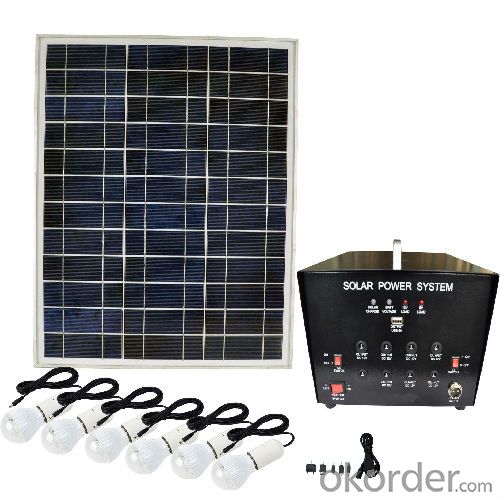
RELATED PRODUCTS
| System Type | AC/DC Off Gird Solar Power System | ||||
| Model | SHS1250 | SHS1265 | SHS12100 | SHS12200 | SHS24200 |
| Solar Panel | 100W | 150W | 200W | 2x200W | 2x300W |
| Battery | 50Ah | 65Ah | 100Ah | 200Ah | 2x200Ah |
| Output Power | 300W | 500W | 600W | 1000W | 1500W |
| Modified wave | Modified wave | Pure sine wave | Pure sine wave | Pure sine ware | |
| Carton Size | 300*180*470mm | 400*180*470mm | 525*248*640mm | 615*302*640mm | 600*550*420mm |
| Applicable Scope | TV, Fan, Radio, Refrigerator, Air-conditioner | ||||
- Q:What is the impact of tree shade on the performance of solar panels?
- The impact of tree shade on the performance of solar panels can be significant. When solar panels are shaded by trees, their ability to convert sunlight into electricity is greatly reduced. This is because shade prevents direct sunlight from reaching the panels, reducing their overall efficiency. Shade on solar panels can create a phenomenon known as "partial shading," where only a portion of the panel is shaded. In this case, the shaded portion of the panel acts as a barrier, preventing the unshaded portion from producing electricity at its maximum capacity. This results in a decrease in the overall energy production of the solar panel system. Tree shade can also cause an imbalance in the output of solar panels that are connected in series. When one panel is shaded, it can significantly reduce the performance of the entire series, as the shaded panel acts as a bottleneck for the flow of electricity. This can lead to a decrease in the overall energy generation of the solar system. It is worth mentioning that the impact of tree shade on solar panels depends on various factors such as the intensity and duration of the shade, the orientation and tilt angle of the panels, and the efficiency of the panels themselves. Additionally, advancements in solar panel technology, such as the use of bypass diodes in modern systems, can help mitigate the negative effects of shading to some extent. To optimize the performance of solar panels in the presence of tree shade, it is important to consider the placement and design of the solar panel system. This may involve trimming or removing trees that cast shade on the panels, adjusting the tilt angle of the panels to minimize shade impact, or considering alternative locations for the installation of the panels where shade is less of a concern. Overall, tree shade can have a significant impact on the performance of solar panels, reducing their efficiency and energy production. It is crucial to carefully consider the effects of shade when planning and designing a solar panel installation to maximize its effectiveness.
- Q:Can a solar energy system be used in areas with limited sunlight?
- Yes, a solar energy system can still be used in areas with limited sunlight. While solar panels do require sunlight to generate electricity, they can still produce power even in areas with less sunlight. Additionally, advancements in solar technology, such as the use of more efficient panels and energy storage systems, have made it possible to harness solar energy in regions with limited sunlight.
- Q:Can solar energy systems be used for powering recycling or waste management facilities?
- Yes, solar energy systems can be used to power recycling or waste management facilities. Solar energy can be harnessed through the installation of solar panels, which can generate electricity to meet the energy requirements of these facilities. By utilizing solar power, recycling or waste management facilities can reduce their reliance on traditional energy sources, lower their carbon footprint, and contribute to a more sustainable and environmentally friendly operation.
- Q:Can solar energy systems be used for powering water pumps in rural areas?
- Yes, solar energy systems can definitely be used for powering water pumps in rural areas. Solar-powered water pumping systems are increasingly being used in remote areas where access to electricity is limited or expensive. These systems use solar panels to capture sunlight and convert it into electricity, which is then used to power the water pumps. This sustainable and renewable energy solution is cost-effective, environmentally friendly, and can provide a reliable source of water for agricultural, domestic, and irrigation purposes in rural communities.
- Q:How do solar energy systems impact national energy policy?
- Solar energy systems have a significant impact on national energy policy as they promote the transition to renewable energy sources, reduce greenhouse gas emissions, and enhance energy independence. By incentivizing the adoption of solar power through policies such as tax credits and feed-in tariffs, governments can diversify their energy mix, decrease reliance on fossil fuels, and achieve sustainability goals. Additionally, the growth of the solar industry creates job opportunities, stimulates economic growth, and fosters innovation in clean energy technologies. Overall, solar energy systems play a crucial role in shaping national energy policies towards a more sustainable and resilient future.
- Q:Can solar energy systems be used in powering religious institutions like churches or temples?
- Yes, solar energy systems can certainly be used to power religious institutions like churches or temples. In fact, solar power is an ideal solution for these buildings as they often have large roofs that can accommodate solar panels. By installing solar energy systems, religious institutions can significantly reduce their electricity bills, save money, and become more sustainable. Solar panels generate electricity by converting sunlight into usable energy. This energy can be used to power the lighting, heating, cooling, and other electrical needs of the religious institution. With advancements in solar technology, it is now possible to store excess energy in batteries, ensuring uninterrupted power even during cloudy days or at night. Using solar energy not only reduces the operational costs of the religious institution but also helps in reducing its carbon footprint. By reducing dependency on fossil fuels, solar power systems contribute to mitigating climate change and promoting environmental stewardship. This aligns with the core values of many religious organizations that emphasize the importance of environmental sustainability and being responsible stewards of the Earth. Furthermore, solar energy systems can serve as a visible example of the religious institution's commitment to sustainable practices, inspiring its members and the wider community to adopt renewable energy solutions. By utilizing solar power, religious institutions can demonstrate their dedication to caring for the planet and encouraging others to follow suit. In summary, solar energy systems can be successfully used to power religious institutions like churches or temples. They offer an environmentally-friendly and cost-effective solution that aligns with the values of many religious organizations. By embracing solar power, these institutions can reduce their energy costs, promote sustainability, and inspire their members and the community to adopt clean energy solutions.
- Q:Can a solar energy system be used during a power outage?
- Yes, a solar energy system can be used during a power outage as long as it is equipped with battery storage. The battery storage allows the energy generated by the solar panels to be stored and used when the sun is not shining or during a power outage. However, if the solar energy system is not equipped with battery storage, it will not be able to provide electricity during a power outage.
- Q:How do solar energy systems impact the carbon footprint of a home?
- Solar energy systems have a significant positive impact on reducing the carbon footprint of a home. By harnessing the power of the sun, these systems generate clean and renewable energy, which reduces or even eliminates the need for fossil fuel-based electricity. This transition to solar energy decreases the home's reliance on carbon-intensive power sources, resulting in a substantial reduction in greenhouse gas emissions and ultimately contributing to a more sustainable and environmentally friendly lifestyle.
- Q:Can solar energy systems be used for powering food processing or packaging plants?
- Yes, solar energy systems can be used for powering food processing or packaging plants. Solar energy systems, such as photovoltaic panels, can generate electricity from the sun's rays. This electricity can then be used to power various processes and machinery in food processing or packaging plants. Food processing and packaging plants typically require a significant amount of energy to operate their machinery, lighting, refrigeration, and other systems. By utilizing solar energy, these plants can reduce their dependence on fossil fuels and lower their carbon footprint. Solar energy systems can be installed on the rooftops or open spaces near the food processing or packaging plants. The energy generated by these systems can be directly used or stored in batteries for later use. In some cases, excess energy can even be sold back to the power grid, providing an additional source of revenue. While the initial setup cost of solar energy systems can be high, the long-term benefits outweigh the expenses. Solar energy is a renewable and clean source of power, reducing the reliance on non-renewable resources and minimizing greenhouse gas emissions. Furthermore, solar energy systems can be integrated with energy-efficient technologies such as LED lighting, energy management systems, and heat recovery systems to further enhance the overall efficiency of food processing or packaging plants. In summary, solar energy systems are a viable and sustainable option for powering food processing or packaging plants. They offer numerous benefits, including reduced operational costs, lower environmental impact, and increased energy independence.
- Q:Can solar energy systems be used for space exploration?
- Yes, solar energy systems can be used for space exploration. In fact, solar panels are commonly used in spacecraft to provide power for various systems and instruments. Solar energy is reliable, abundant, and can be harnessed even in space where sunlight is not filtered by the Earth's atmosphere.
1. Manufacturer Overview |
|
|---|---|
| Location | |
| Year Established | |
| Annual Output Value | |
| Main Markets | |
| Company Certifications | |
2. Manufacturer Certificates |
|
|---|---|
| a) Certification Name | |
| Range | |
| Reference | |
| Validity Period | |
3. Manufacturer Capability |
|
|---|---|
| a)Trade Capacity | |
| Nearest Port | |
| Export Percentage | |
| No.of Employees in Trade Department | |
| Language Spoken: | |
| b)Factory Information | |
| Factory Size: | |
| No. of Production Lines | |
| Contract Manufacturing | |
| Product Price Range | |
Send your message to us
Portable Solar Power Systerm Kits/Camping Kits Home Use 2000W Solar System
- Loading Port:
- Shanghai
- Payment Terms:
- TT or LC
- Min Order Qty:
- 2000 watt
- Supply Capability:
- 200000 watt/month
OKorder Service Pledge
OKorder Financial Service
Similar products
New products
Hot products
Hot Searches
Related keywords
